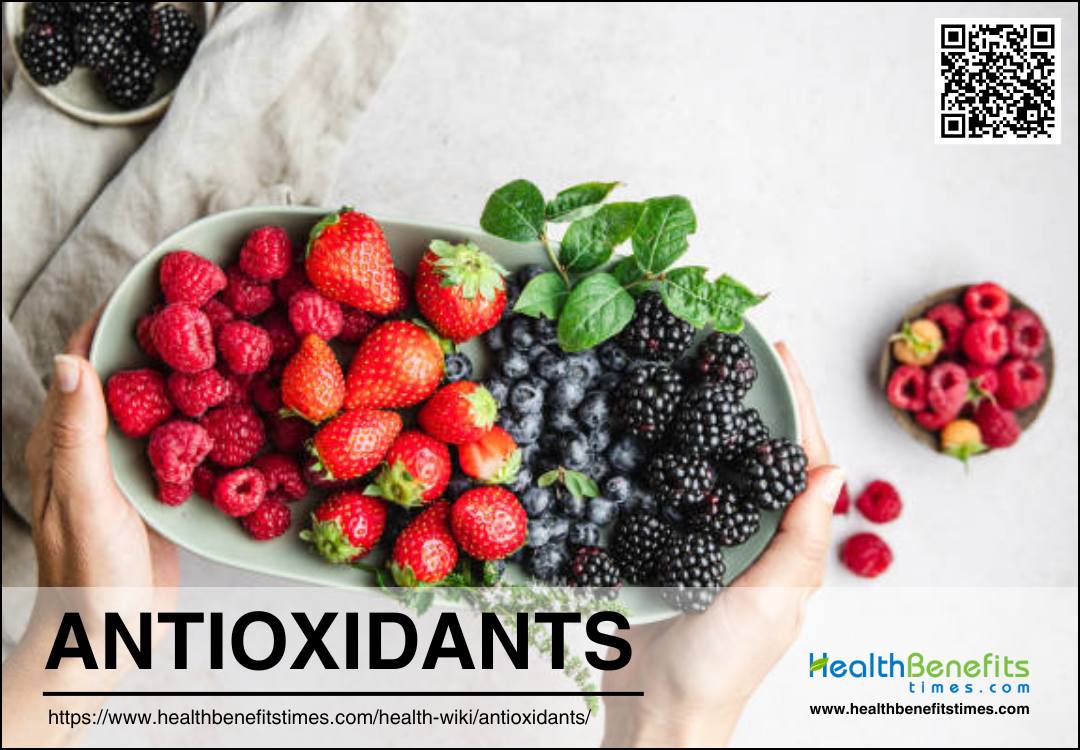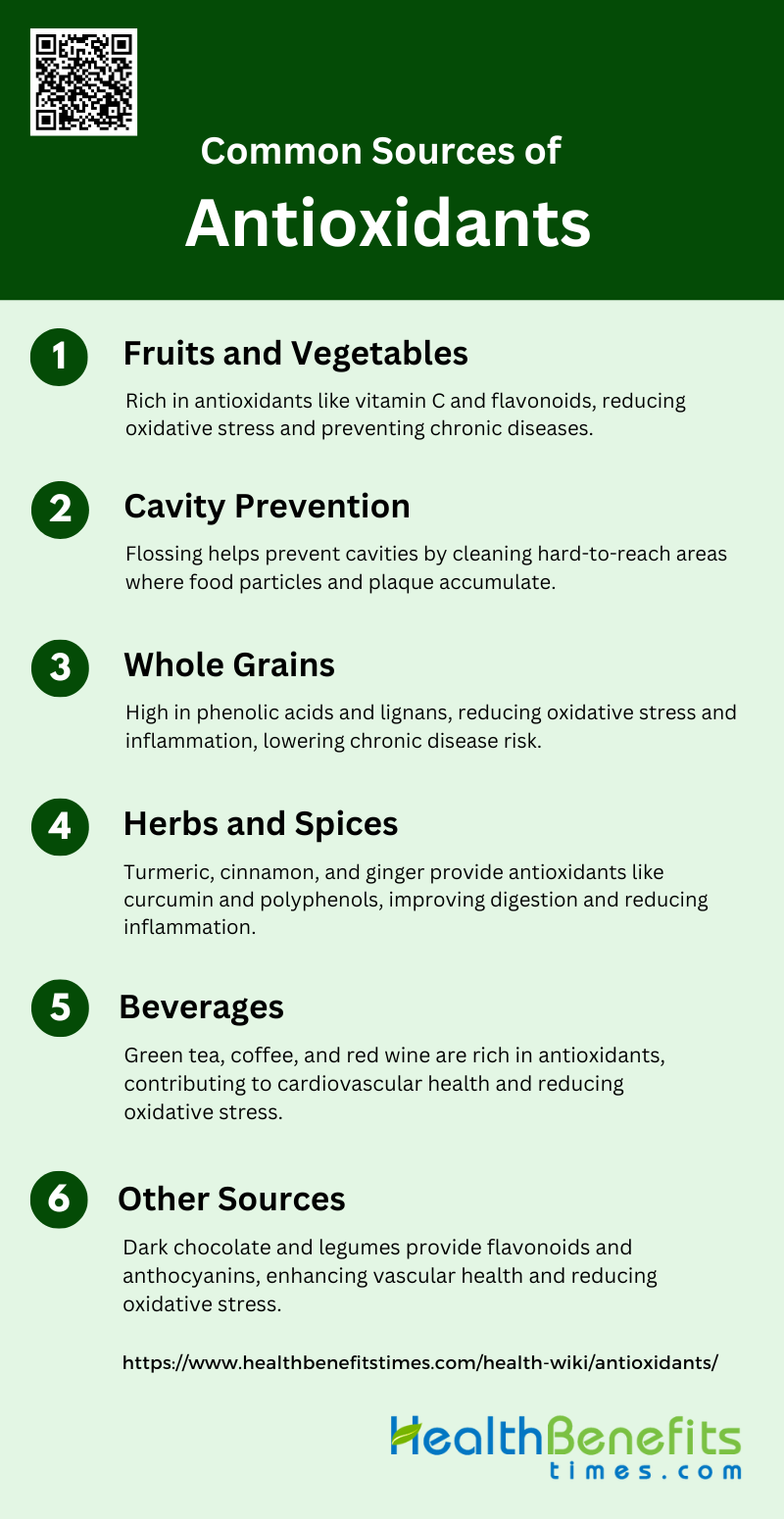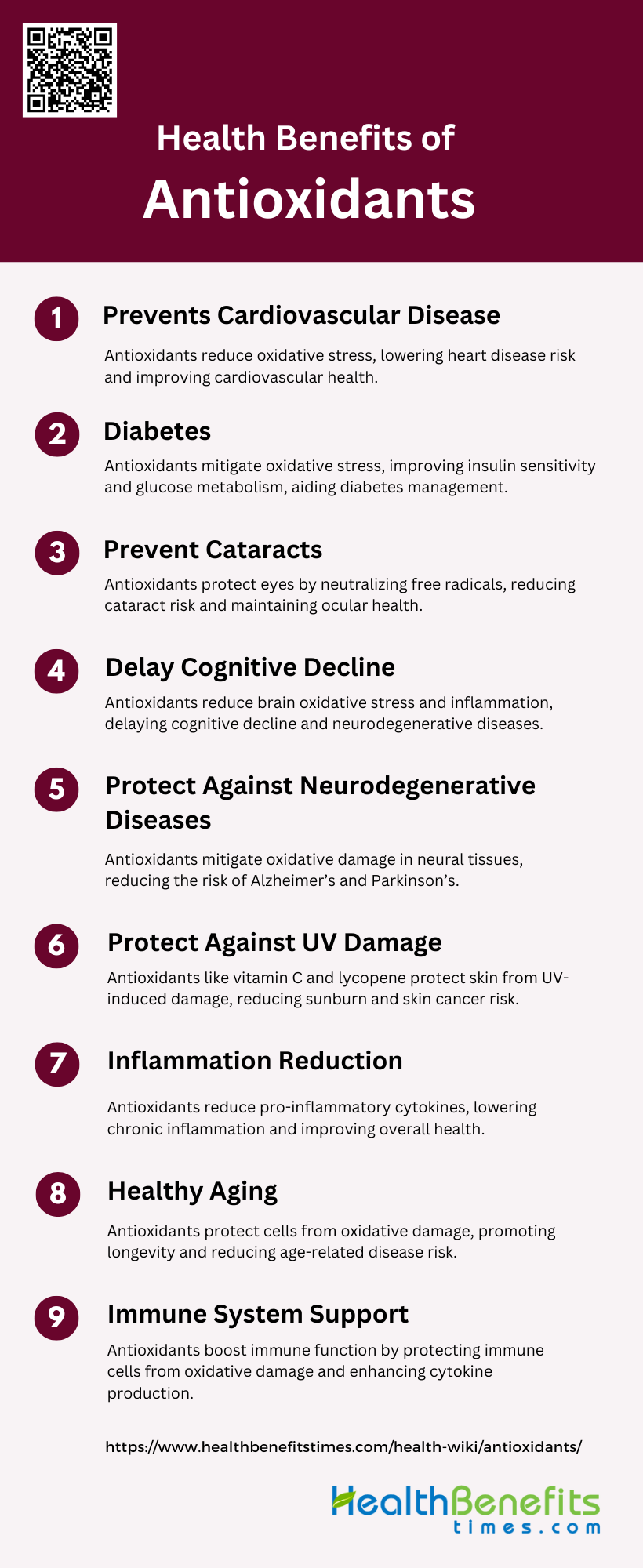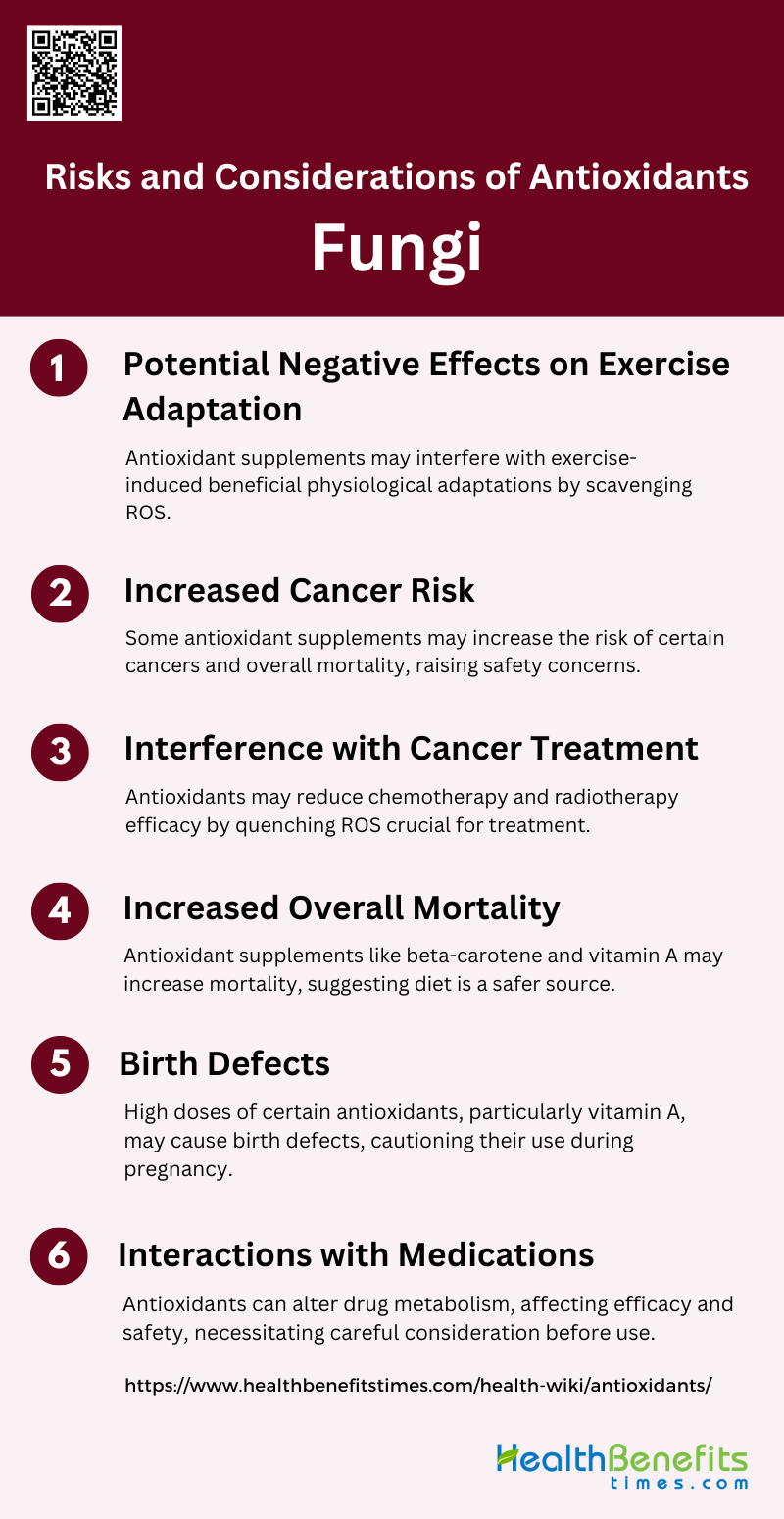Antioxidants are substances that help protect cells from damage caused by free radicals, which are unstable molecules produced during normal cellular processes and in response to environmental stressors. These compounds work by neutralizing free radicals, thereby preventing oxidative stress and maintaining a balance within the body. Antioxidants can be found naturally in a wide variety of foods, particularly fruits, vegetables, and whole grains, as well as in some herbs and spices. Common examples of antioxidants include vitamins C and E, selenium, carotenoids, and various bioactive compounds. By reducing oxidative damage, antioxidants play a crucial role in promoting overall health and may help prevent or mitigate the effects of numerous diseases, including cardiovascular disorders, neurodegenerative conditions like Alzheimer’s disease, and certain types of cancer.
How Do Antioxidants Work?
Mechanism of Action
Antioxidants protect cells from damage by neutralizing free radicals, which are highly reactive molecules that can cause oxidative stress. This neutralization occurs through various mechanisms, such as donating electrons to free radicals, thereby stabilizing them and preventing them from reacting with cellular components like DNA, proteins, and lipids. Enzymatic antioxidants like superoxide dismutase and catalase, as well as non-enzymatic antioxidants such as vitamins C and E, play crucial roles in this defense system. By maintaining redox homeostasis, antioxidants help in preserving cellular integrity and function.
Impact of Free Radicals on Aging and Diseases
Free radicals are implicated in the aging process and the development of various diseases. They cause oxidative damage to cellular components, leading to the deterioration of cellular functions over time. This oxidative stress is a significant factor in the pathogenesis of chronic diseases such as cancer, cardiovascular diseases, neurodegenerative disorders, and diabetes. The central nervous system is particularly vulnerable due to its high lipid content and low antioxidant enzyme activity, making it susceptible to neurodegenerative diseases. Thus, managing oxidative stress through antioxidants is crucial for mitigating the effects of aging and disease progression.
Antioxidants as a Defense System against Oxidative Stress
Antioxidants serve as a critical defense system against oxidative stress by scavenging free radicals and repairing oxidative damage. The body employs a complex network of antioxidants, including enzymatic antioxidants like glutathione peroxidase and non-enzymatic antioxidants such as flavonoids and polyphenols, to counteract the harmful effects of reactive oxygen species (ROS) and reactive nitrogen species (RNS). Dietary antioxidants from fruits and vegetables further enhance this defense mechanism, reducing the risk of oxidative stress-related diseases and promoting overall health. This multifaceted antioxidant defense system is essential for maintaining cellular health and preventing oxidative damage.
Common Sources of Antioxidants
Antioxidants are vital compounds that protect our cells from damage caused by free radicals. These molecules can help prevent chronic diseases and promote overall health. Below is a list of common sources of antioxidants that you can incorporate into your diet to reap their numerous benefits:
1. Fruits and Vegetables
Fruits and vegetables are rich sources of antioxidants such as vitamin C, flavonoids, carotenoids, and polyphenols. These compounds are known for their ability to scavenge harmful free radicals, thereby reducing oxidative stress and preventing degenerative diseases like cancer, diabetes, and cardiovascular diseases. Berries, citrus fruits, leafy greens, and tomatoes are particularly high in these antioxidants. For instance, berries are rich in phenolic flavonoids, while tomatoes contain lycopene, a potent antioxidant.
2. Nuts and Seeds
Nuts and seeds, including almonds, walnuts, and sunflower seeds, are excellent sources of antioxidants like vitamin E and selenium. These antioxidants play a crucial role in protecting cellular components from oxidative damage. Vitamin E, a fat-soluble antioxidant, helps in maintaining cell membrane integrity, while selenium is essential for the proper functioning of antioxidant enzymes like glutathione peroxidase.
3. Whole Grains
Whole grains such as oats, quinoa, and brown rice are packed with antioxidants, including phenolic acids and lignans. These compounds contribute to the total antioxidant capacity of whole grains, helping to reduce oxidative stress and inflammation. The consumption of whole grains has been linked to a lower risk of chronic diseases, including heart disease and type 2 diabetes, due to their high antioxidant content.
4. Herbs and Spices
Herbs and spices like turmeric, cinnamon, and ginger are rich in specific antioxidants such as curcumin and polyphenols. Curcumin, found in turmeric, has potent anti-inflammatory and antioxidant properties, while polyphenols in cinnamon and ginger help in neutralizing free radicals. These antioxidants contribute to the health benefits of herbs and spices, including improved digestion and reduced inflammation.
5. Beverages
Beverages such as green tea, coffee, and red wine are notable for their high antioxidant content. Green tea contains catechins, which are powerful antioxidants that help in reducing oxidative stress and improving cardiovascular health. Coffee is rich in polyphenols, and red wine contains resveratrol, which has been shown to have cardioprotective effects. These beverages contribute significantly to the daily intake of antioxidants.
6. Other Sources
Other sources of antioxidants include dark chocolate, legumes, and additional whole grains. Dark chocolate is rich in flavonoids, which have been shown to improve vascular health and reduce inflammation. Legumes contain anthocyanins, which are potent antioxidants that help in reducing oxidative stress. These foods provide a diverse range of antioxidants that contribute to overall health and well-being.
Health Benefits of Antioxidants
Antioxidants are essential for protecting our cells from oxidative stress and damage. They help in reducing inflammation, boosting the immune system, and lowering the risk of chronic diseases. Here are some significant health benefits of antioxidants:
1. Prevents Cardiovascular Disease
Antioxidants play a crucial role in preventing cardiovascular diseases by reducing oxidative stress and inflammation, which are key contributors to conditions such as atherosclerosis, coronary heart disease, and arterial hypertension. Dietary antioxidants like vitamin E, vitamin C, and carotenoids, found in fruits and vegetables, act as scavengers of reactive oxygen species, thereby protecting the cardiovascular system from damage. Studies have shown that a diet rich in these antioxidants can significantly lower the risk of heart disease and improve overall cardiovascular health.
2. Diabetes
Antioxidants have been found to be beneficial in managing diabetes by mitigating oxidative stress, which is a significant factor in the pathogenesis of diabetes and its complications. Lycopene, a potent antioxidant, has shown promise in reducing oxidative stress and inflammation, thereby improving insulin sensitivity and glucose metabolism. Consuming antioxidant-rich foods such as fruits, vegetables, and nuts can help in the effective management of diabetes and reduce the risk of associated complications.
3. Prevent Cataracts
Oxidative stress is a major factor in the development of cataracts, a common age-related eye condition. Antioxidants such as vitamin C, vitamin E, and carotenoids like lutein and zeaxanthin can protect the eyes by neutralizing free radicals and reducing oxidative damage to the lens. Regular consumption of antioxidant-rich foods has been associated with a lower risk of cataract formation and progression, highlighting the importance of these nutrients in maintaining ocular health.
4. Delay Cognitive Decline
Antioxidants are essential in delaying cognitive decline and protecting against neurodegenerative diseases such as Alzheimer’s. They help in reducing oxidative stress and inflammation in the brain, which are key factors in the progression of cognitive impairment. Compounds like polyphenols and carotenoids have shown significant neuroprotective effects by enhancing brain-derived neurotrophic factor (BDNF) and modulating oxidative stress pathways. Regular intake of antioxidant-rich foods can support brain health and delay the onset of cognitive decline.
5. Protect Against Neurodegenerative Diseases
Neurodegenerative diseases such as Alzheimer’s and Parkinson’s are closely linked to oxidative stress and inflammation. Antioxidants like lycopene, polyphenols, and vitamins C and E can mitigate these effects by scavenging free radicals and reducing oxidative damage in neural tissues. These antioxidants also modulate signaling pathways that promote neuronal survival and function. Consuming a diet rich in these nutrients can provide neuroprotection and reduce the risk of developing neurodegenerative diseases.
6. Protect Against UV Damage
Antioxidants can protect the skin from UV-induced damage by neutralizing free radicals generated by UV radiation. Compounds such as vitamin C, vitamin E, and carotenoids like beta-carotene and lycopene have been shown to enhance the skin’s defense against UV damage, reducing the risk of sunburn, photoaging, and skin cancer. Regular consumption of antioxidant-rich foods can improve skin health and provide a natural defense against harmful UV rays.
7. Inflammation Reduction
Chronic inflammation is a key factor in many diseases, including cardiovascular diseases, diabetes, and neurodegenerative disorders. Antioxidants possess strong anti-inflammatory properties that help in reducing the production of pro-inflammatory cytokines and oxidative stress markers. Phytochemicals like polyphenols and carotenoids have been particularly effective in modulating inflammatory pathways and reducing systemic inflammation. Incorporating antioxidant-rich foods into the diet can significantly lower inflammation and improve overall health.
8. Healthy Aging
Antioxidants play a vital role in promoting healthy aging by protecting cells from oxidative damage, which is a major contributor to the aging process. Compounds such as vitamins C and E, carotenoids, and polyphenols help in maintaining cellular integrity and function, thereby reducing the risk of age-related diseases. Regular intake of antioxidant-rich foods can enhance longevity and improve the quality of life by mitigating the effects of oxidative stress and inflammation.
9. Immune System Support
Antioxidants are crucial for a robust immune system as they protect immune cells from oxidative damage and enhance their function. Vitamins C and E, along with other antioxidants, stimulate the production of cytokines and immunoglobulins, which are essential for an effective immune response. A diet rich in antioxidant nutrients can boost immune function, reduce the risk of infections, and improve overall immune health.
Risks and Considerations of Antioxidants
While antioxidants are beneficial for health, it’s important to be aware of potential risks and considerations. Overconsumption of antioxidant supplements can lead to adverse effects and may interfere with certain medications. Here are some risks and considerations of antioxidants:
1. Potential Negative Effects on Exercise Adaptation
Antioxidants, particularly nonenzymatic supplements like vitamins C and E, have been shown to potentially interfere with exercise-induced physiological adaptations. Exercise training (ET) increases the production of reactive oxygen species (ROS), which play a crucial role in signaling pathways that promote beneficial adaptations such as mitochondrial biogenesis and improved insulin sensitivity. However, the use of antioxidant supplements can scavenge these ROS, potentially blunting these adaptive responses. Studies have shown inconsistent results, with some indicating negative effects on redox status and mitochondrial pathways when antioxidants are combined with ET.
2. Increased Cancer Risk
While antioxidants are often consumed for their potential health benefits, some studies suggest they may increase the risk of certain cancers. For instance, a systematic review and meta-analysis found that antioxidant supplements, including beta-carotene, vitamins A, C, E, and selenium, did not prevent gastrointestinal cancers and might even increase overall mortality. Specifically, beta-carotene and vitamin A, as well as beta-carotene and vitamin E, were associated with a significant increase in mortality, raising concerns about their safety in cancer prevention. Additionally, some antioxidants may interfere with the body’s natural oxidative stress responses, potentially promoting cancer progression.
3. Interference with Cancer Treatment
The use of antioxidant supplements during cancer treatment is controversial. Some studies suggest that antioxidants can reduce the side effects of chemotherapy and radiotherapy, but there is also evidence that they may interfere with the efficacy of these treatments. For example, antioxidants like vitamins and polyphenols can quench ROS, which are crucial for the cytotoxic effects of certain anticancer therapies. This interference could potentially reduce the effectiveness of the treatment, particularly in smokers undergoing radiotherapy. Therefore, the use of antioxidants during cancer treatment should be carefully considered and monitored.
4. Increased Overall Mortality
Antioxidant supplements have been linked to increased overall mortality in some studies. A number of randomized clinical trials and systematic reviews have shown that supplements such as beta-carotene, vitamin A, and vitamin E may increase mortality rates. These findings suggest that antioxidant supplements do not provide the expected health benefits and may even pose risks, particularly in well-nourished populations. The optimal source of antioxidants appears to be from a balanced diet rather than supplements.
5. Birth Defects
There is limited but concerning evidence regarding the potential for antioxidants to cause birth defects. High doses of certain antioxidants, such as vitamin A, have been associated with teratogenic effects, leading to birth defects. Pregnant women are often advised to avoid high doses of vitamin A supplements due to the risk of congenital malformations. While the evidence is not extensive, it underscores the importance of cautious use of antioxidant supplements during pregnancy.
6. Interactions with Medications
Antioxidants can interact with various medications, potentially altering their efficacy and safety. For example, antioxidants like vitamin E and selenium can affect the metabolism of certain drugs, leading to either reduced effectiveness or increased toxicity. Additionally, antioxidants may interfere with the action of medications that rely on oxidative stress mechanisms, such as certain chemotherapeutic agents. These interactions highlight the need for careful consideration and consultation with healthcare providers before combining antioxidant supplements with other medications.
FAQs
1. What are the different types of antioxidants?
Antioxidants can be classified into several types, including enzymatic antioxidants (such as superoxide dismutase and catalase), non-enzymatic antioxidants (such as vitamins C and E, selenium, and carotenoids), and bioactive compounds (like flavonoids and polyphenols). Each type has a different mechanism of action and contributes uniquely to protecting cells from oxidative stress.
2. Can antioxidants be found in animal-based foods?
While antioxidants are primarily found in plant-based foods, they are also present in some animal-based foods like fish, eggs, and dairy products. For example, certain fish are rich in selenium, and eggs contain lutein and zeaxanthin, which are antioxidants beneficial for eye health.
3. Do cooking methods affect the antioxidant content of foods?
Yes, cooking methods can impact the antioxidant content of foods. For example, boiling or steaming vegetables may preserve more antioxidants compared to frying or grilling, which can reduce the levels of some heat-sensitive antioxidants like vitamin C. The best cooking method depends on the specific food and antioxidant being considered.
4. Are there any benefits to consuming antioxidant supplements?
While antioxidant supplements may provide benefits in certain circumstances, such as vitamin C to prevent scurvy or selenium deficiency treatment, they are generally not recommended as a substitute for a balanced diet. Excessive intake of antioxidant supplements has been linked to potential health risks, including increased mortality in some cases.
5. How much antioxidant intake is recommended daily?
There is no universal daily recommended intake for all antioxidants, as the needs may vary based on factors like age, sex, lifestyle, and health conditions. However, a diet rich in fruits, vegetables, nuts, and whole grains is generally considered sufficient to meet the body’s antioxidant needs.
6. Can antioxidants help with skin conditions other than UV damage?
Yes, antioxidants may help with various skin conditions. For instance, they can reduce inflammation and promote healing in acne, eczema, and psoriasis. Topical antioxidants like vitamin C and E are also used in skincare to reduce fine lines, wrinkles, and pigmentation.
7. What are some signs of antioxidant deficiency?
Signs of antioxidant deficiency may include increased susceptibility to infections, slower wound healing, fatigue, and premature aging. Severe deficiencies in specific antioxidants like vitamin C or E can lead to scurvy or neuropathy, respectively.
8. Are there any populations that may particularly benefit from increased antioxidant intake?
Populations that may benefit from increased antioxidant intake include the elderly, smokers, individuals exposed to high levels of pollution, and people with chronic inflammatory conditions. These groups are more susceptible to oxidative stress and may need more antioxidants to maintain health.
9. Can antioxidants affect mood or mental health?
Yes, some studies suggest that antioxidants may have a positive impact on mood and mental health. For example, oxidative stress is linked to conditions like depression and anxiety, and antioxidants such as omega-3 fatty acids, flavonoids, and vitamins C and E may help alleviate symptoms by reducing inflammation and oxidative damage in the brain.
10. How can I tell if a food is high in antioxidants?
Foods high in antioxidants often have bright colors, such as red, orange, yellow, blue, or purple. For instance, blueberries, carrots, spinach, and tomatoes are all rich in antioxidants. Checking food labels for vitamin content and other compounds like flavonoids and carotenoids can also help identify antioxidant-rich foods.





